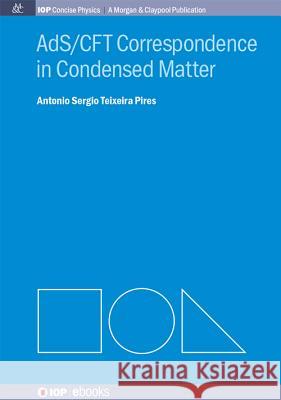Ads/Cft in Condensed Matter » książka
Ads/Cft in Condensed Matter
ISBN-13: 9781627053082 / Angielski / Miękka / 2014 / 95 str.
Introduces, in a very elementary way, the concept of anti-de Sitter/Conformal Field Theory (AdS/CFT) correspondence to condensed matter physicists. This theory relates a gravity theory in a (d+1)-dimensional anti-de Sitter space time to a strongly coupled d-dimensional quantum field theory living on its boundary.
AdS/CFT correspondence in condensed matter introduces, in an elementary way, the idea of the anti de-Sitter/Conformal Field Theory (AdS/CFT) correspondence to condensed matter physicists. This theory relates a gravity theory in a (d+1)- dimensional anti-de Sitter spacetime to a strongly-coupled d- dimensional quantum field theory living on its boundary. The AdS/CFT correspondence can be used to study finite temperature real time processes, such as response functions and dynamics far from equilibrium in quantum critical points in condensed matter systems. Computation of these quantities is reduced to solving classical gravitational equations in one higher dimension than the original theory.This book is a concise introduction, presenting the general foundations for condensed matter physicists, to the AdS/CFT correspondence. The author has presented and focused on a review and explanation of relevant materials. The interested reader can consult the references to get more detailed explanations and information. There are many papers and good reviews about the subject, but most use a language that demands some knowledge about the subject. In this presentation the author has utilized more accessible language for a non-specialized reader.Chapter 2 introduces Quantum Phase Transitions for physicists with limited background knowledge in the subject. Chapter 3, is a brief overview of the general relativity theory, so that the reader can perform calculations without knowing the subject. In Chapter 4, it is shown that choosing a metric, in a manifold with an extra dimension and with all the symmetries of the field theory at the critical point, leads to a metric of a space which is the AdS space. Then an accessible example of a scalar field is presented. However, the theory is at zero temperature. To work at finite temperature a black hole is introduced in the theory in section 4.3. Condensed matter physics is generally interested in the presence of an electric or magnetic field. This is treated in section 4.4. In chapter 5 and 6, the author presents a brief introduction about dynamics. Holographic superconductor and fermions are studied in chapter 7, and the authors conclusions are presented in chapter 8.











